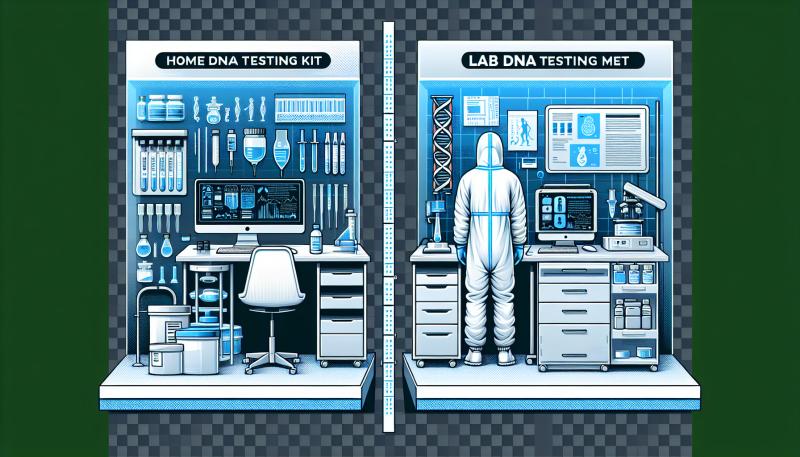
Home vs. Lab DNA Testing: Choosing the Right Option for You
In today’s world, the need to better understand our genetic makeup is more significant than ever. DNA testing has evolved from a complex laboratory procedure to something accessible at home with the advent of home DNA testing kits. However, choosing between home DNA testing and laboratory testing can be challenging, especially with the variety of options available. This guide aims to help individual consumers make informed decisions by comparing the benefits and drawbacks of each type of DNA testing, evaluating purposes, accuracy, cost, privacy concerns, and convenience.
Understanding DNA Testing
DNA testing involves analyzing specific genetic markers within an individual's DNA to provide insights about ancestry, health predispositions, and even certain personal traits. Whether it’s uncovering ancestral roots or identifying potential genetic health risks, DNA tests have become a powerful tool for personal discovery and preventative health care.
The Basics of Home DNA Testing
Home DNA testing kits, such as those offered by companies like AncestryDNA and 23andMe, allow individuals to collect DNA samples in the comfort of their own homes. The process typically involves ordering a kit online, collecting a saliva sample, and mailing it back to the company for analysis. Results are usually available in a few weeks via an online account, providing users a detailed report on their ancestry or certain health markers.
Benefits of Home DNA Testing:
- Convenience: Conduct the test at home with simple instructions and minimal effort.
- Quick Results: Receive responses in a matter of weeks.
- Affordable: Often less expensive than lab testing; costs usually range from $50 to $200.
- User-Friendly Reports: Digital reports are easy to access and understand.
Despite these advantages, home DNA tests have potential limitations in terms of depth and detail, as they may not be as comprehensive due to the simplified testing process.
The Overview of Lab DNA Testing
Laboratory DNA testing is performed in a professional setting, frequently accompanied by expert guidance. This method is employed for more in-depth analysis, such as paternity testing, forensic testing, or extensive health screenings. Usually, a medical professional collects the DNA sample, and testing is conducted in laboratory conditions ensuring high accuracy and reliability.
Advantages of Lab DNA Testing:
- Accuracy and Precision: Higher accuracy due to professional handling and advanced technology.
- Comprehensiveness: Detailed analysis with a wide range of applications, from legal matters to health screenings.
- Expert Guidance: Professional advice can be provided before and after testing to help interpret results.
- Reliability: Trusted for legal and forensic purposes due to stringent laboratory protocols.
Nevertheless, lab DNA testing can be more time-consuming and expensive, often requiring appointments and insurance participation to cover costs.
Purpose and Application
The choice between home and lab DNA testing often hinges on the purpose of the test. Home DNA testing is typically suitable for general purposes such as ancestry and knowing predispositions to certain genetic traits, whereas lab DNA tests are better for legally binding situations, such as paternity disputes or serious health diagnostics.
Assessing Accuracy
While home DNA tests are reasonably accurate, especially when determining general ancestry patterns or common genetic traits, they may not match the precision of lab-based testing for more detailed insights. Laboratories use sophisticated techniques that are continuously refined, resulting in highly accurate results necessary for legal and medical scenarios.
Cost Considerations
Pricing plays a significant role in the decision-making process. Home DNA tests are generally more budget-friendly, appealing to consumers seeking quick and general insights. Conversely, laboratory DNA testing may be more costly, justifying the price with comprehensive analysis and rigorous testing protocols. When considering costs, weigh the test’s purpose to ensure it aligns with your budget and needs.
Privacy and Data Security
Data privacy is a crucial concern for many consumers when choosing DNA tests. Home DNA testing companies often store data for research or improvements; hence, it's vital to read their privacy policies thoroughly. Laboratory settings may offer more controlled environments for data protection, an essential consideration for sensitive uses such as legal tests.
Convenience and Accessibility
For many, the simplicity of home DNA testing is hard to beat. It eliminates logistical challenges and is accessible to almost everyone with internet access. However, for those needing precise and authoritative results, the structured environment of lab DNA testing might be worth the extra effort and potential inconvenience of appointments and travel.
Conclusion: Making Your Choice
Your decision between a home DNA test and a lab DNA test ultimately hinges on your specific needs and priorities. For casual or preliminary insights into your genetic heritage or predispositions, a home DNA test may be entirely sufficient. However, if your interest spans critical medical information or you need guaranteed accuracy for legal claims, opting for a laboratory DNA test may be wise.
As both home and lab DNA testing kits become more widespread, individual consumers can access previously unavailable genetic insights. Whichever route you choose, ensure that informed decisions equip you with the necessary knowledge to make the most of your genetic discovery journey. With IMS Screening Solutions, you can explore various testing options tailored to your needs and priorities.
Additional Considerations
It's important to be aware of emerging issues in DNA testing, such as genetic discrimination or misinterpretation of test results. Always consult with healthcare professionals when making health-related decisions based on DNA testing feedback, safeguarding your journey of genetic exploration.
